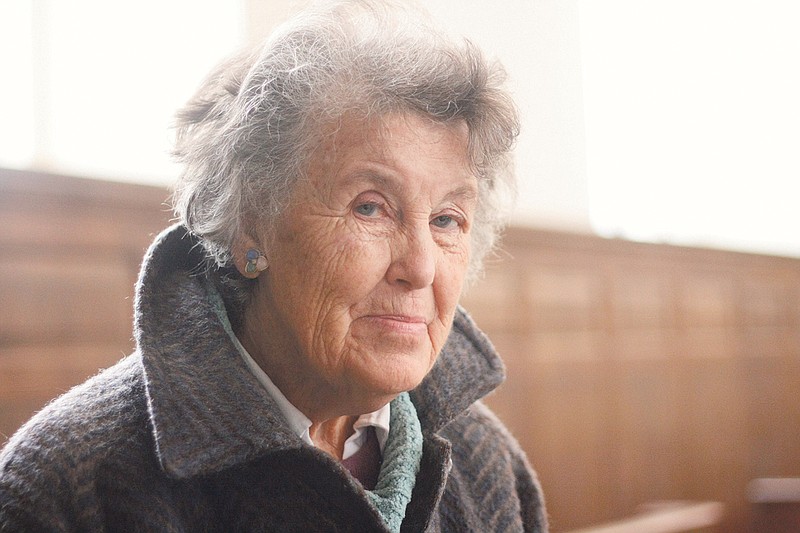Wednesday's ceremony commemorating the 70th anniversary of the London blitz bombing had special meaning to three British residents attending the event in Fulton.
One of them was Rhona Havers, who was 11 years old when German Luftwaffe bombs rained down near her home.
Two others were Professor Michael Rose and his wife Christine. Rose was 4 years old and his wife was age 2 when they survived German bombing raids in December of 1940.
Havers is the mother of Rob Havers, executive director of the National Churchill Museum in Fulton, who presided over the joint London-Fulton church bell ringing ceremony Wednesday.
Havers, 83, said she vividly recalls the German bombing attacks when she had to go to air raid shelters.
Havers said she lived in an open area in Kent. "When there were air raids we went to air raid shelters that were nothing more than holes in the ground. Those who lived in London took shelter in the underground. We lived in Kent, which is southeast of London. The bombings were erratic and could hit almost anywhere. When the Germans bombed London we saw it in the distance and it burned all night," Havers said.
Havers said her brother was a fighter pilot in the Royal Air Force. "But it still is very difficult to talk about what went on during the war. It was so traumatic, especially for young people. I and many other people my age just don't talk about it much. It was such a sad time," Havers said.
Rose, 74, is a retired history professor at the University of Manchester in England.
Rose was living in Sheffield, a steel town north of London. "It's a big steel city much as Pittsburgh in the United States. The Germans were targeting the steel mills to disable them during the war. My father was a church minister. There was an old house with a basement cellar in the old rectory where we sought shelter from the bombing attacks," Rose said.
As a 4-year-old child, Rose said he can recall "the bangings and crashings of the bombs. My father tried to calm my fears by telling me it was just giants fighting in the sky."
Many of the bombs intended for the nearby steelworks fell on the center of Sheffield. "I still have a teddy bear which someone bought for me as a Christmas present. A week after the teddy bear was purchased the big store where it was purchased was destroyed by firebombs. So I guess my teddy bear and I both survived the blitz," Rose said.
"My hometown of Manchester endured heavy raids in December of 1940. Bombings were not very accurate. Bombs intended for one area ended up in another place," Rose said.
Rose's wife Christine grew up in Wakefield, located a few miles north of Sheffield.
"Since I was only 2 years old at the time," Christine Rose said, "I don't have much memory of the blitz but I was told about it only two years ago by a remaining aunt of mine. I knew my family was living in an area where there was heavy bombings. My aunt told me my crib was by a window. A big bomb hit outside. Plaster was falling in our house and the window by my crib had fallen in. My father rushed in to check on me and found my crib covered with glass, plaster, and big chunks of wood. But somehow I escaped without a scratch."
"The only time I can remember being scared during the war was when I was 4 or 5 years old. Airplanes were flying extremely low over our house. They were literally skimming the rooftops," she said.
As it turned out British airplanes were practicing runs for use of the famed bouncing bombs that bounced across water before crashing into and destroying the Mohne Dam in Germany on May 17, 1943.
Rose said during the war if anyone saw an American soldier in uniform they would ask him: "Got any gum, chum?" Candy and nylon stockings also were in high demand from American soldiers because candy and nylons were rationed.
"We were too young for Lucky Strike cigarettes," Rose said, "but American soldiers also had them."
After attending the ceremony, the Roses toured the Fulton church and were shown the stone steps from the original Church of St. Mary in London built in 1181. They are the original 27 stone steps that led to crypts in 1181. The steps were placed in the current church's bell tower during the 1969 reconstruction of the church in Fulton.

